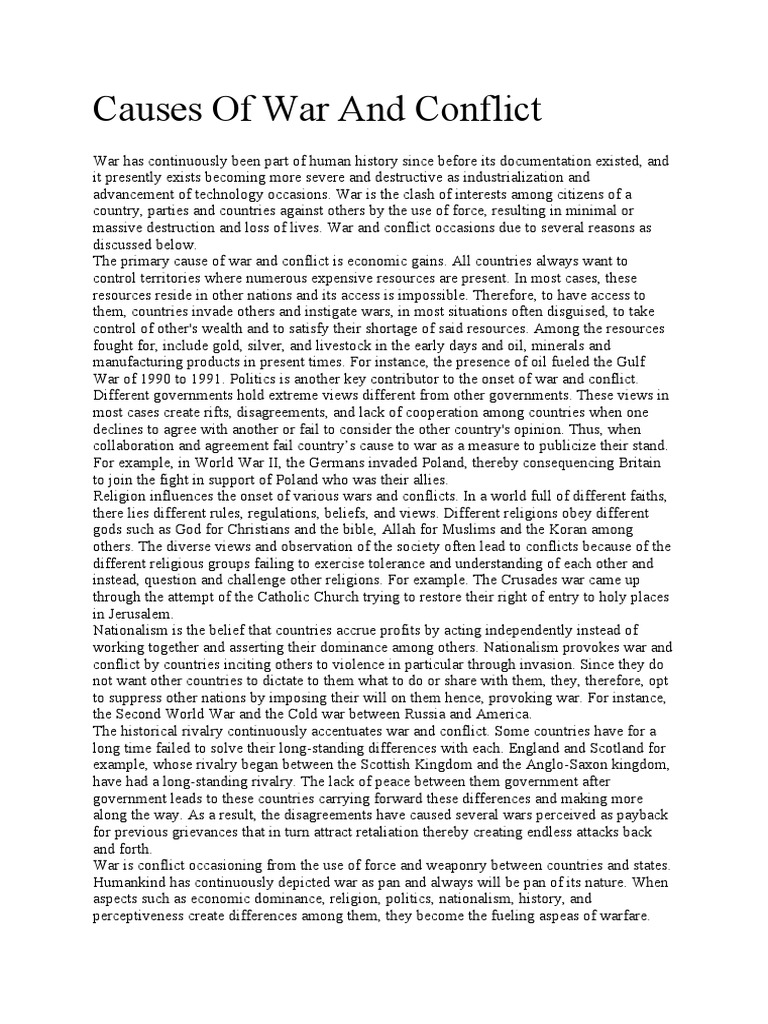War, a phenomenon as old as civilization itself, incites a myriad of responses, both passionate and rational. The Bahá’í Faith, with its universal principles and teachings, offers a distinctive perspective on the intricate tapestry of conflict. Understanding the root causes of war from a Bahá’í viewpoint entails delving not only into the surface-level disputes but also into underlying socio-economic, political, and spiritual dimensions.
At the core of Bahá’í teachings lies the assertion that the disunity of humankind is the principal instigator of conflicts. This disunity manifests in various forms: nationalistic fervor, religious schisms, and economic inequalities. The Bahá’í Faith posits that these divisions engender mutual distrust and animosity, thereby breeding an environment ripe for conflict. It is imperative to acknowledge that while superficial disagreements may appear to be the catalyst for wars, these disputes often conceal deeper, systemic issues that require careful examination.
One of the more profound insights offered by Bahá’í teachings is the notion that ignorance—both intellectual and moral—serves as a prelude to conflict. When individuals or groups fail to comprehend the perspectives and needs of others, a polarized mindset ensues. This lack of understanding perpetuates a cycle of enmity and retaliation, as parties engage in hostilities without grasping the broader implications of their actions. Thus, fostering education and enlightenment emerges as a crucial step in mitigating the potential for war.
Furthermore, the Bahá’í perspective emphasizes the detrimental impact of economic disparity on social cohesion. It elucidates how wealth inequality not only exacerbates tensions between different societal factions but also generates an environment where conflict thrives. Poverty and deprivation can foster desperation, leading individuals to resort to violence as a means of asserting their rights or securing resources. Therefore, addressing the structural inequalities that underlie these economic disparities becomes essential in the pursuit of lasting peace.
Political strife is another significant factor contributing to the prevalence of war. The Bahá’í teachings assert that when governance is characterized by corruption, oppression, or a lack of accountability, it creates fertile ground for dissent and rebellion. The resultant instability often spirals into open conflict, as marginalized groups rise against perceived injustices. Thus, promoting democratic frameworks characterized by transparency, equity, and inclusivity is paramount to preventing political conflicts from escalating into war.
A particularly salient point within Bahá’í thought is the interplay between religion and conflict. Whereas many religions have been historically co-opted to justify violence, the Bahá’í Faith advocates for a unifying spiritual message that transcends sectarian boundaries. This perspective recognizes that when religious tenets are manipulated to serve political agendas, they can incite division and violence. True religion, however, emphasizes the oneness of humanity and the imperative of fostering love and compassion among all people. Hence, guiding humanity toward a genuine understanding of the spiritual teachings common to all faiths can help quell religious discord.
Moreover, the Bahá’í teachings illuminate the importance of global consciousness in addressing the scourge of war. The interdependent nature of modern societies necessitates a recognition that conflict in one part of the world can reverberate through the global community. As such, the notion of collective security is paramount. The Bahá’í Faith advocates for the establishment of a global governing body with the authority to mediate conflicts, impose sanctions, and promote disarmament. It envisions a collaborative approach to global governance, transcending national interests in favor of a holistic perspective that prioritizes human welfare.
In the realm of personal conduct, the Bahá’í teachings advocate for the cultivation of virtues such as patience, forgiveness, and empathy. By fostering these qualities within individuals and communities, a culture of peace can gradually take root. When individuals approach interpersonal conflicts with a mindset geared toward understanding and reconciliation, the likelihood of escalation diminishes significantly. This transformation on a micro-level can, in turn, influence broader societal norms and attitudes toward conflict.
Moreover, the Bahá’í Faith underscores the role of consultation in resolving disputes. Consultation, defined as the process of collective decision-making through open dialogue and mutual respect, is critical in achieving consensus and fostering unity. This method of engagement allows for diverse perspectives to be considered, ultimately leading to more satisfactory and enduring solutions. By institutionalizing consultation at both community and governmental levels, societies can cultivate environments that prioritize collaboration over confrontation.
Lastly, the Bahá’í teachings encourage a vision of peace that encompasses not only the absence of war but also the presence of justice. A just peace is one that acknowledges and rectifies historical grievances, promotes economic equity, and upholds the dignity of every individual. Achieving such a peace requires not only the cessation of hostilities but also a strategic commitment to building resilient societies that actively work against the roots of inequality and discord.
In conclusion, the Bahá’í perspective on the causes of war offers a multifaceted understanding that moves beyond mere surface interpretations. By recognizing the interconnectedness of societal, economic, and spiritual factors, the teachings provide a roadmap for addressing the root causes of conflict. As humanity grapples with the complexities of war and peace in the modern era, it is essential to cultivate a global consciousness that prioritizes unity, understanding, and justice. Only then can the specter of war be truly vanquished, paving the way for a more harmonious and cohesive world.
